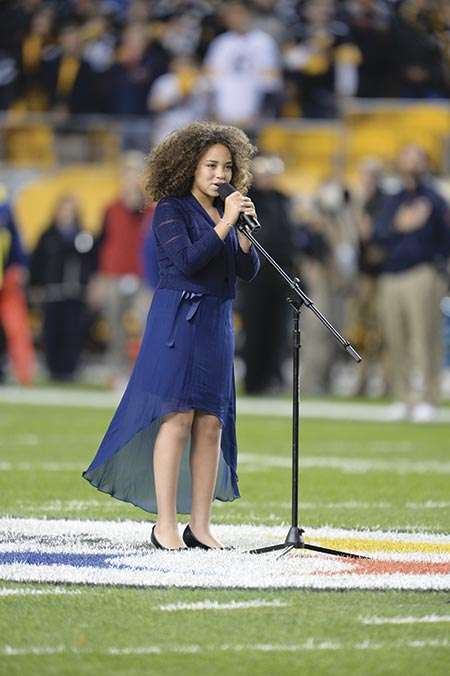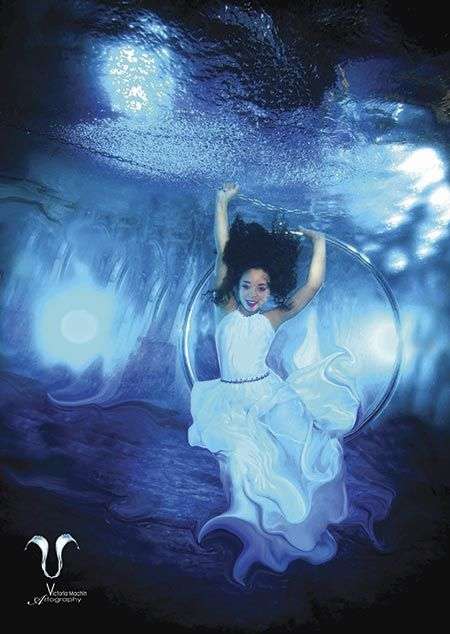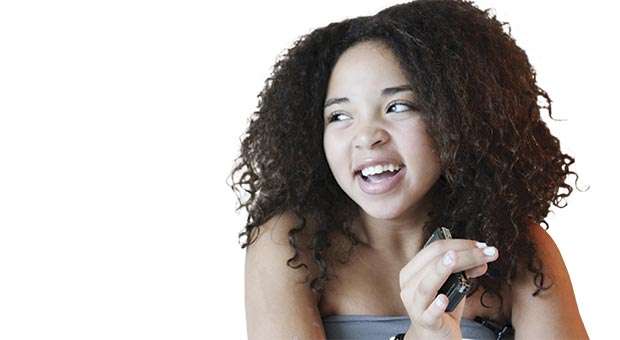The lights come on and a fine layer of mist covers the stage. In the center, a silhouette appears, and her voice, accompanied only by a piano, softly caresses the first notes. In a few seconds, you realize that it’s “I Will Always Love You,” but the singer is not Whitney Houston, or Adele, much less the great Celia Cruz, even though this singer has performed songs by all of them at one point or another. Her name is Paola Guanche, she is 12 years old, and when the song really gets going and she unleashes the full potential of her vocal chords, no one—not her family, or the studio audience, or a single one of the thousands of people who support her in the United States, Latin America, and Cuba—have the slightest doubt about how this program is going to end.
In a couple of decades, when biographers—who are always addicted to key dates, befores and afters, and turning points—want to pinpoint the start of Paola Guanche’s career, they will probably choose the night when this singer of Cuban descent won the first season of La Voz Kids.
At least, that’s what they’ll say. However, even she might not know her real start, the revelation, that moment when her course became clear, because if those types of things actually happen, we rarely realize it. Maybe her need to sing began in Cancún, Mexico, where she was born, the moment she first heard a song played on the piano by her father, Cuban composer Orlando Guanche. Or maybe it was a little later, when she was 5, and her mother, Cuban singer Lourdes Nuviola, showed her the film La bella de la Alhambra, from which Paola learned her first song, “Quiéreme mucho.” Or perhaps it was when she heard her aunt, Aymée Nuviola, sing a bolero. Most likely it was all of those experiences combined, because that is the way of art: a search, an accumulation of discoveries and intuitions.
It is Saturday afternoon and Paola looks tired. She has just given a telephone interview to a radio station, had a long week at school—an art school where she learns singing, dance, acting, what could be called complete training—and about seven days ago she was in Pittsburg, at the Steelers football stadium, singing the American national anthem in front of 70,000 people. Moreover, today she is planning to go to a friend’s birthday party; even though she chose what might be one of the hardest paths to take, and to do so with discipline, she has not given up on being a little girl, having fun, having friends, and enjoying her family, those microcosms that orbit around her.
“The truth is, all of my life, ever since I was very little, I’ve always wanted to be onstage,” she says. “At first I dreamed about being a dancer instead of a singer, and I even took classes for a while, but every time I sing, I realize that it’s really my thing. I like dancing a lot, but singing is what I really want to do. When I sing, I go over every song in my mind as if it were a story; I get inside the character, and I experience it. I don’t rehearse my movements very much, because I like them to come out naturally, but I do study the lyrics to understand what they’re saying, and to know how to perform them.”

Since the age of five she has sung on television programs relatively frequently, without having received conventional singing classes until now, just vocalizing once in a while with her mother and aunt—formerly the Nuviola Sisters duo—and singing a few tunes with her father at the piano.
She made it onto La Voz Kids almost by accident, when a friend of her father’s who had heard her on the program Sábado Gigante talked to them about a contest on the Telemundo television network for Latino children with an aptitude for singing. It was a Spanish-language version of The Voice, a show broadcast by NBC.
After several auditions, Paola was selected to participate in blind audition rounds, the first that were broadcast on television. There, the three coaches—Paulina Rubio, Prince Royce and Roberto Tapia—listened to the contestants with their backs to the stage and decided, simply from their voices, whether they wanted to have them on their respective teams.
When Paola sang “Turning Tables” by Adele, something happened; it was one of those moments that a grandiloquent philosopher would describe as transcendental and that a tacky romantic would call magic. As the girl sang, the three celebrities looked at each other with surprised expressions, without daring to turn around. On the other side of the cameras, her whole family applauded, and Orlando Guanche just wept. The first to turn around was Tapia, followed a few seconds later by Paulina Rubio and Prince Royce. They finally saw the source of that voice, which was too mature and almost unreal for a 12-year-old girl. Afterward they wrangled about for who would take her, and it was she who got to decide.
“It was funny that I chose Prince Royce, because the genre he sings is different from mine, which is ballads. Although you might notice that it is very much closer to Paulina’s (pop) or Tapia’s (regional Mexican). But I went with Prince Royce not just for the money, but for the challenge. I’m not interested in things that are easy; I’m always looking for new challenges to find out what I can do. In the end, I think I made the right decision.”
She speaks slowly, taking her time with an assurance that is sometimes disconcerting. Sometimes she laughs and touches her hair, but she never loses her self-control. Everything seems to come easy now, completely naturally, but it was a different story during the last few minutes before each performance. Her mind would race 100 miles a minute. “Will they choose me? What if I trip and fall? What if they don’t like me? Does this dress look good on me?” As hard as she tried to control herself, clear her mind, and think of something else, she couldn’t. However, once they called her name and she went out onstage….

“It was incredibly magical. I would step onto the stage and all my fears were gone. It’s like when you’re feeling bad and you take a hot bath and relax, that’s how I felt. Because the stage is my second home, it’s where I feel safest. And even more so when I would see so many people supporting me, and yelling for me; that made me feel good. And if I forgot the lyrics, well then at least I enjoyed it and that’s the most important thing.”
“I always thought I could win,” she says, “but there were times when I saw it as really difficult, because the other two finalists, Alanis Gonzalez and Alan Ponce, had a lot of votes and a lot of people supporting them. When I heard my name I didn’t know what to do, because I really wasn’t expecting it. One of the things that excited me the most was feeling how happy the other singers were for me, when they hugged me and congratulated me. Even if I won, I’m not going to let it go to my head, because in the end we’re all human and nobody is better than anybody else.”
That night, after learning what the vote was, the public began chanting her name and then they began chanting “Cuba.” Paola has been on the island only once, and she was too little to remember it now. But it’s enough to hear her speaking Spanish with her slight Havana accent, or to watch her dance to Celia Cruz’s “Químbara” to realize that this girl is first and foremost Cuban. In Cuba, people followed all of her performances with soap opera-like devotion, in the most diverse and alternative ways, and more than one would have voted for her with pleasure. Her maternal grandfather, who teaches English in a Havana neighborhood, is no longer called Osvaldo—now he’s better known as “Paola’s grandfather.”
“I’ve heard that in Cuba they supported me a lot and I want to thank everybody for that,” she says. “I know that because of problems with technology and all of that they didn’t have a way of voting there, I could feel their good vibes on the stage, and every time I sang I felt them with me, because they were practically the ones who supported me the most. They’ve sent me messages by Internet, my hairdressers told me that over there they write really nice things about me, they’ve made key chains with my photo, and all of that makes me feel very special and loved. I want them to know that I love them very much too, and I hope to visit them soon to be able to see all of my people.”
She smiles and looks out at the buildings, the ocean and the day’s last rays of light. She half-closes her eyes as if wanting to see something farther beyond, but what she observing is not in front of her eyes; it’s behind, in her memories. At just 12, she already has that lucid expression reflecting lots of intuition and wisdom, a wisdom that is not acquired, but that some women have from the beginning of time.
“I don’t want to be like anybody else. I want to be a unique artist and be remembered or my charisma, for what I am. There are a lot of artists that I love, like my idol, Michael Jackson, but I do everything that I do and I try as hard as I can to create my own style. That’s what I want to do: make my own mark, one that nobody’s ever done before. In the end that’s every artist’s goal.”

In a very short time, Paola has achieved what many artists pursue all of their lives without ever even getting close. All it needs is a little intonation, a little bit more than a sigh, and her voice inexorably takes you with it. You hear not only her, but also the infinite possibilities that she opens with each note, the promise of what she could become. You might not even like the song, but with her it always acquires different nuances, because when she sings, she does it the same way that she looks at the ocean: with a centuries-old habit.
By: Abel Sanchez











Love ur songs